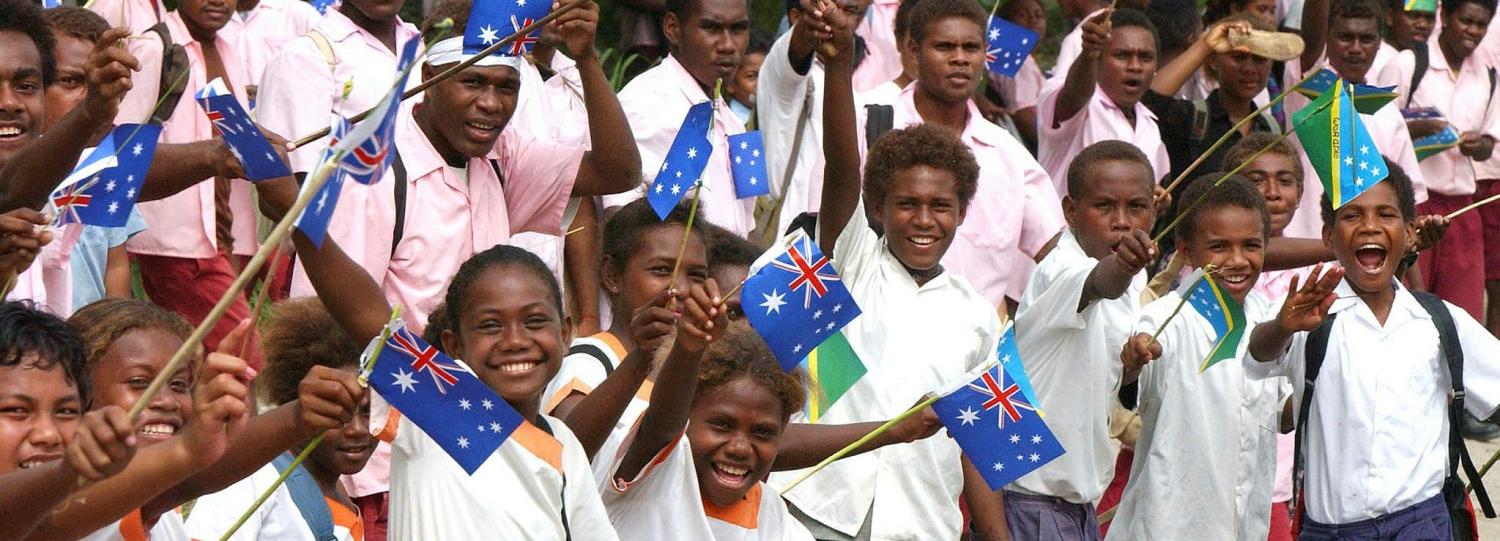Almost 14 years ago I stepped off an Air Vanuatu plane in Honiara to the astonishing sight of an airfield covered with khaki army tents and several thousand Solomon Islanders holding up placards with various iterations of greetings, peace and thanks. I was in Honiara to join the RAMSI team, serving as one of two Department of Foreign Affairs and Trade policy advisers to the mission’s first Special Coordinator, Nick Warner. I had arrived on a regular flight a couple of hours in advance of the chartered QANTAS plane which brought in Warner, AFP Assistant Commissioner Ben McDevitt, Australian Army Lt Col. John J Frewen and New Zealand Deputy Special Coordinator Peter Noble – the group that became known as the 'RAMSI principals'.
In what must have been one of the world’s most unusual receptions for an intervention force, the thousands of Solomon Islanders surrounding Henderson Airfield - and thousands more who emerged from the hills and the bush - cheered and clapped as RAMSI’s leaders descended onto the tarmac. Some of the crowd sang hymns of praise. Solomon Islands 'warriors' challenged the new arrivals with their spears before official protocol kicked in and the Prime Minister of Solomon Islands, Sir Allan Kemakeza, stepped out to welcome the arrival of the largest foreign force in his country since World War II. The sense of anticipation and the broad smiles on the faces of every Solomon Islander I could see humbled me. I remember thinking briefly that this event could rival the second coming in this deeply Christian country.
Fast forward to this week and Honiara is celebrating again, not the second coming but the departure of what Prime Minister Manasseh Sogavare described as 'divine intervention to the country’s call for help'. A week-long program of farewell events for the Regional Assistance Mission will hail the significant achievements of the 14 year-long effort to stabilise Solomon Islands. And they are indeed significant, spectacular even.
The rapid restoration of law and order in the early months of RAMSI in 2003; the high-profile arrests of Harold Keke and Jimmy Rasta;, the gun amnesty that enabled the community to surrender over 3700 weapons; the stabilisation of government finances and the improvements to government machinery that enabled better delivery of essential services: these were all crucial accomplishments.
Solomon Islands is undoubtedly more stable now than it was in 2003. RAMSI brought the nation back from the brink of collapse and that should be celebrated. But in this week of looking back at achievements, divine or otherwise, it is important also to look forward. The Archbishop of the Church of Melanesia, George Takeli posed the most relevant question for the post-RAMSI era in Solomon Islands (during an ecumenical service to give thanks for RAMSI last weekend):
What are we looking for? And where do we go from here? As we celebrate this service, do we have a goal? Do we have an aim? A saying goes 'if we aim at nothing, we will hit nothing'.
I have argued previously that RAMSI stayed in Solomon Islands longer than was necessary. Every precaution has been taken to ensure that Solomon Islands can move forward without the RAMSI crutch. RAMSI may be leaving but Australian assistance remains, in the form of $142 million in aid next financial year, including substantial support for the Royal Solomon Islands Police Force. The very substantial spending by Australia on the mission during the last 14 years has helped to make Solomon Islands one of the most aid-dependent nations in the world and there are a range of donors supporting development in the country.
The development challenges of Solomon Islands are many and outlined succinctly by DFAT here. But the most substantial challenge is one that was not addressed by RAMSI: endemic corruption in the political class of Solomon Islands. While RAMSI worked with Solomon Islands officials to improve governance in the public sector, the nation’s politicians did little to reform their own poor governance practices. With some notable exceptions, members of parliament often worked at cross-purposes to the objectives of the Regional Assistance Mission, or deliberately undermined its work, creating a perception that there were two governing authorities in Solomon Islands.
RAMSI had no mandate to work on political reform and too few Solomon Islands Members of Parliament were interested in using the opportunity that RAMSI’s presence offered to push for much needed changes in the political system. Unfortunately, enduring improvements to accountability and transparency can only be guaranteed if political leaders take responsibility for change. The political system currently encourages the political class to undermine the rule of law and spend ever-increasing sums of money on enriching themselves and their supporters. Until that changes, it is possible that many of the accountability gains brokered by RAMSI may be lost.
Prime Minister Sogavare, previously a vociferous opponent of RAMSI, effusively praised it this week and his support for the its objectives - including better governance, better policing and better economic management - is encouraging. But the history of Solomon Islands politics shows that it is rare that all members of parliament unite behind their Prime Minister.
We can hope that RAMSI has enabled and empowered Solomon Islanders to demand better from their government in the future; to demand an answer to Archbishop Takeli’s question that will deliver for the whole country.

